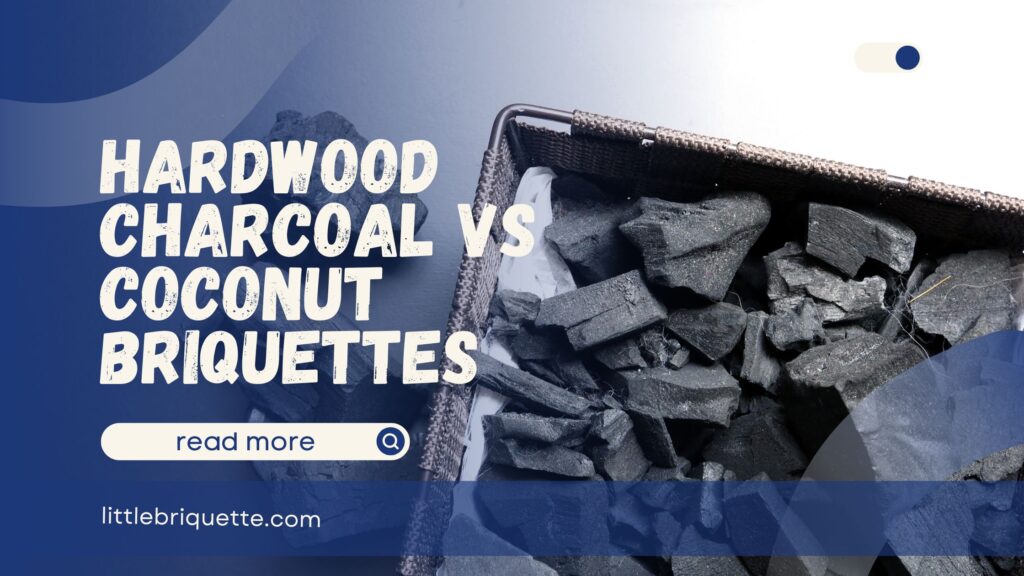In the world of cooking and barbecuing, choosing the right charcoal can be crucial for the flavor and overall culinary experience. Two commonly used fuel options are hardwood charcoal vs coconut briquettes, both of which offer cleaner and more environmentally friendly burning. With the many choices available on the market, this article aims to provide an in-depth comparison of these two types of charcoal, helping you find the best option suited to your cooking needs. Below is a comprehensive explanation of the differences between hardwood charcoal vs coconut briquettes.
What is Hardwood Charcoal?
Hardwood charcoal is a fuel produced through a pyrolysis process, where wood is burned in low-oxygen conditions. This process removes moisture and volatile components, resulting in charcoal that is rich in carbon. Typically, hardwood charcoal is made from hardwood species such as oak, hickory, and mesquite, known for their high density and ability to produce consistent heat. The production process can be done traditionally by stacking wood and covering it, or through more modern industrial methods using specialized ovens.
The main characteristics of this type of fuel are its ability to reach high temperatures and its longer burn time compared to other types of charcoal. This charcoal not only provides strong heat but also releases a distinctive aroma that can enhance the flavor of the food being cooked, especially when used for grilling meats and vegetables. Additionally, the burning process of hardwood charcoal tends to be cleaner, producing little smoke and residue, making it a favorite choice among barbecue enthusiasts.
What are Coconut Briquettes?
Coconut briquettes are a fuel made from coconut shells, which are a byproduct of the coconut industry. The production process begins with the collection of dried coconut shells, which are then crushed into a fine powder. This powder is compacted using high-pressure machines without any added chemicals, forming dense, uniform briquettes. This process not only optimizes the use of coconut waste but also creates an efficient product for cooking and barbecuing.
The main characteristics of coconut briquettes are their environmentally friendly properties and cleaner burning. Because they are produced from natural materials, these briquettes produce less smoke and emissions compared to conventional charcoal, making them a healthier choice for both the environment and users. Additionally, coconut briquettes can provide stable and long-lasting temperatures, making them ideal for various types of cooking. With this combination of advantages, coconut briquettes are becoming an increasingly popular alternative among grill enthusiasts who are concerned about sustainability.
Read Also: Lump or Briquette for Smoking, Which is More Enjoyable?
Performance Comparison of Hardwood Charcoal vs Coconut Briquettes
In their use as fuel, hardwood charcoal and coconut briquettes each offer unique advantages for cooking and barbecuing. Below is a performance comparison between these two cooking fuels.
Burn Time

Burn time is one of the important factors in choosing charcoal for cooking. Hardwood charcoal is known for its long duration, often lasting 4-5 hours with stable burning. This capability makes it ideal for barbecuing, especially for large cuts of meat or dishes that require slow cooking. This advantage allows users to focus more on the cooking process without frequently needing to add more charcoal.
On the other hand, coconut briquettes also have a decent burn time, although generally slightly shorter, around 2-4 hours. However, the main advantage of these briquettes is their consistency; they are designed to provide even burning throughout that period. Both types offer adequate burn times, but your choice may depend on the type of dish you want to prepare and the time you have for cooking.
Temperature Produced of Hardwood Charcoal vs Coconut Briquettes

The second aspect of performance comparison between hardwood charcoal and coconut briquettes lies in the temperatures produced. Hardwood charcoal can reach very high maximum temperatures, often exceeding 700 degrees Fahrenheit (about 370 degrees Celsius). This temperature is ideal for grilling meat, resulting in juicy outcomes and perfect caramelization. The heat produced allows barbecue enthusiasts to achieve an outstanding sear on steaks and other foods, creating rich and complex flavors.
In contrast, coconut briquettes produce slightly lower temperatures, ranging from 500-600 degrees Fahrenheit (about 260-315 degrees Celsius). Although this is not as high as hardwood charcoal, these briquettes still generate stable and consistent heat. This makes them suitable for cooking food slowly and evenly, such as vegetables and fish. Despite the difference in maximum temperatures, both types of charcoal have their respective advantages depending on the desired cooking style.
Aroma and Flavor

The aroma and flavor produced by hardwood charcoal and coconut briquettes are also crucial factors in the cooking experience. Hardwood charcoal imparts a distinctive and deep aroma, often desired in traditional barbecue cooking. When hardwood burns, it releases aromatic compounds that can enhance the flavor of meats and vegetables, creating a richer and more complex gastronomic experience. For barbecue lovers, this aroma becomes an integral part of the enjoyment of outdoor cooking.
Conversely, coconut briquettes have a more neutral aroma, which may not have the same impact as hardwood charcoal. Nevertheless, these briquettes can provide a clean and unobtrusive taste to the food being cooked, making them more suitable for dishes that require a milder flavor. Thus, the choice between these two types of charcoal can depend on the type of dish you want to prepare and the flavor profile you aim to achieve.
Advantages of Coconut Briquettes for Cooking
Coconut briquettes offer several advantages for cooking or barbecuing, making them an attractive choice for grill enthusiasts. First, these briquettes are environmentally friendly, made from sustainable coconut shell waste, which reduces negative environmental impact. Additionally, they produce cleaner burning with minimal smoke and residue, making them healthier for use in outdoor areas. Coconut briquettes also provide stable and long-lasting temperatures, ideal for enjoying a clean taste without interfering with the flavors of the food. With all these benefits, coconut briquettes become an efficient and eco-friendly alternative for a better cooking experience.
Read Also: Flavored Charcoal Briquettes for Delicious Cooking
Export Center for Coconut Charcoal Briquettes Worldwide
To enhance your cooking experience, it is essential to choose high-quality coconut charcoal briquettes backed by certification. You can trust your purchase of coconut charcoal briquettes from Little Briquette, which has become a leading export center in Saudi Arabia and the United Arab Emirates. In addition to these two countries, Little Briquette can also ship worldwide in large quantities while maintaining the quality of the coconut charcoal briquettes.
Contact Little Briquette at this admin number now for an enjoyable cooking experience.

